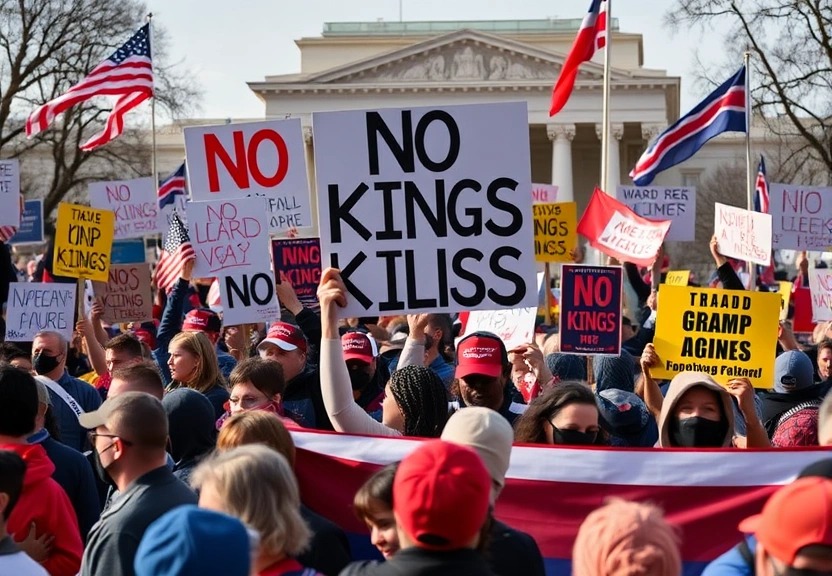Massive “No Kings” Protests Rally Millions Against Trump’s Second Term

Massive “No Kings” Protests Rally Millions Against Trump’s Second Term
The recent “No Kings” protests have emerged as a significant force in the political landscape of the United States, marking a pivotal moment in the ongoing discourse surrounding Donald Trump’s second term. Organized by a coalition of grassroots activists, the movement has mobilized millions of individuals who oppose Trump’s policies and leadership style. This massive demonstration, touted as the largest single-day anti-Trump protest of his second administration, reflects a growing discontent among Americans and signals the potential for significant political shifts in the upcoming elections.

As the nation braces for the implications of a second Trump term, the “No Kings” movement seeks to unify voices across various demographics and ideologies, emphasizing the importance of collective action in the face of perceived authoritarianism. The protests have not only drawn attention to specific issues but have also galvanized a broader conversation about democracy, representation, and the future of American governance.
The “No Kings” Movement: Origins and Objectives
The “No Kings” movement originated as a response to what many activists view as an erosion of democratic principles under the Trump administration. With a focus on grassroots mobilization, the movement has attracted a diverse coalition of individuals who are united by a shared commitment to defending civil liberties, promoting social justice, and advocating for equitable policies.
Key Objectives of the Movement
- Defending Democracy: The movement aims to protect democratic institutions from what they consider authoritarian tendencies.
- Promoting Social Justice: Activists are advocating for policies that address systemic inequalities, including racial and economic disparities.
- Encouraging Civic Engagement: The “No Kings” movement emphasizes the importance of voter participation and activism in shaping political outcomes.
- Building Alliances: The coalition seeks to unite various social movements, including environmentalists, labor rights advocates, and LGBTQ+ groups, under a common banner.
The Scale of the Protests
On the day of the protests, cities across the United States witnessed an unprecedented turnout, with millions of participants gathering in major urban centers. Organizers reported that this was not only a demonstration against Trump but also a celebration of democratic values and a call for accountability in governance.
Locations of Major Protests
Key cities that saw significant mobilization included:
- Washington, D.C.: Thousands gathered at the National Mall, where speakers highlighted the need for justice and equality.
- New York City: Protesters filled Times Square, emphasizing the importance of diverse voices in the political arena.
- Los Angeles: A vibrant rally in downtown L.A. featured music, art, and speeches from local leaders.
- Chicago: Activists marched along Michigan Avenue, demanding systemic change and transparency from elected officials.
Impact on the Political Landscape
The “No Kings” protests have far-reaching implications for the political landscape in the United States. By mobilizing a vast number of individuals, the movement has effectively challenged the narrative surrounding Trump’s popularity and administration. Here are some critical impacts observed:
Shifting Public Sentiment
Polls conducted following the protests indicated a noticeable shift in public sentiment, with many Americans expressing increased skepticism about Trump’s policies and leadership style. This could have significant ramifications for the upcoming elections, as voter turnout and engagement are crucial for influencing outcomes.
Encouragement of Other Movements
The success of the “No Kings” protests has inspired similar movements across the country. Grassroots organizations are now more emboldened to address local issues and mobilize for change, thereby fostering a culture of activism that could reshape political discourse in the United States.
The Role of Social Media in Mobilization
In the age of digital communication, social media played a critical role in the organization and promotion of the “No Kings” protests. Platforms like Twitter, Facebook, and Instagram were instrumental in spreading the word, facilitating connections among activists, and sharing real-time updates during the demonstrations.
Strategies for Effective Mobilization
Some of the key strategies employed by organizers included:
- Utilizing Hashtags: Campaigns such as #NoKings and #Resist gained traction, allowing supporters to share content and engage in discussions.
- Creating Viral Content: Engaging visuals and powerful messages were crafted to resonate with a broad audience, encouraging shares and participation.
- Building Online Communities: Digital spaces were created for individuals to connect, share resources, and plan local actions.
FAQs about the “No Kings” Protests
1. What prompted the “No Kings” protests?
The protests were prompted by concerns over perceived authoritarianism and the erosion of democratic values during Trump’s second administration.
2. How did the organizers mobilize millions of participants?
Organizers utilized social media platforms, grassroots outreach, and strategic partnerships with various social movements to mobilize participants.
3. What were the main messages conveyed during the protests?
The primary messages included calls for defending democracy, promoting social justice, and encouraging civic engagement among voters.
4. What impact did the protests have on public opinion?
Post-protest polls indicated a shift in public sentiment, with many Americans expressing increased skepticism about Trump’s policies and leadership style.
5. Are there plans for future protests or actions by the “No Kings” movement?
Yes, organizers have indicated that they plan to continue mobilizing and advocating for change, with future protests and events in the pipeline.
Conclusion
The “No Kings” protests represent a significant moment in the ongoing struggle for democracy and social justice in the United States. The mass mobilization of millions against Trump’s second term underscores the power of collective action and the importance of civic engagement. As the political landscape continues to evolve, the voices of activists within the “No Kings” movement are likely to play a crucial role in shaping the discourse around governance and representation. The movement’s emphasis on unity and democratic principles serves as a rallying cry for those seeking to hold leaders accountable and promote a more equitable society.
📰 Original Source
Este artigo foi baseado em informações de: https://www.axios.com/2025/06/14/no-kings-protests-usa-june-14-trump-military-parade




